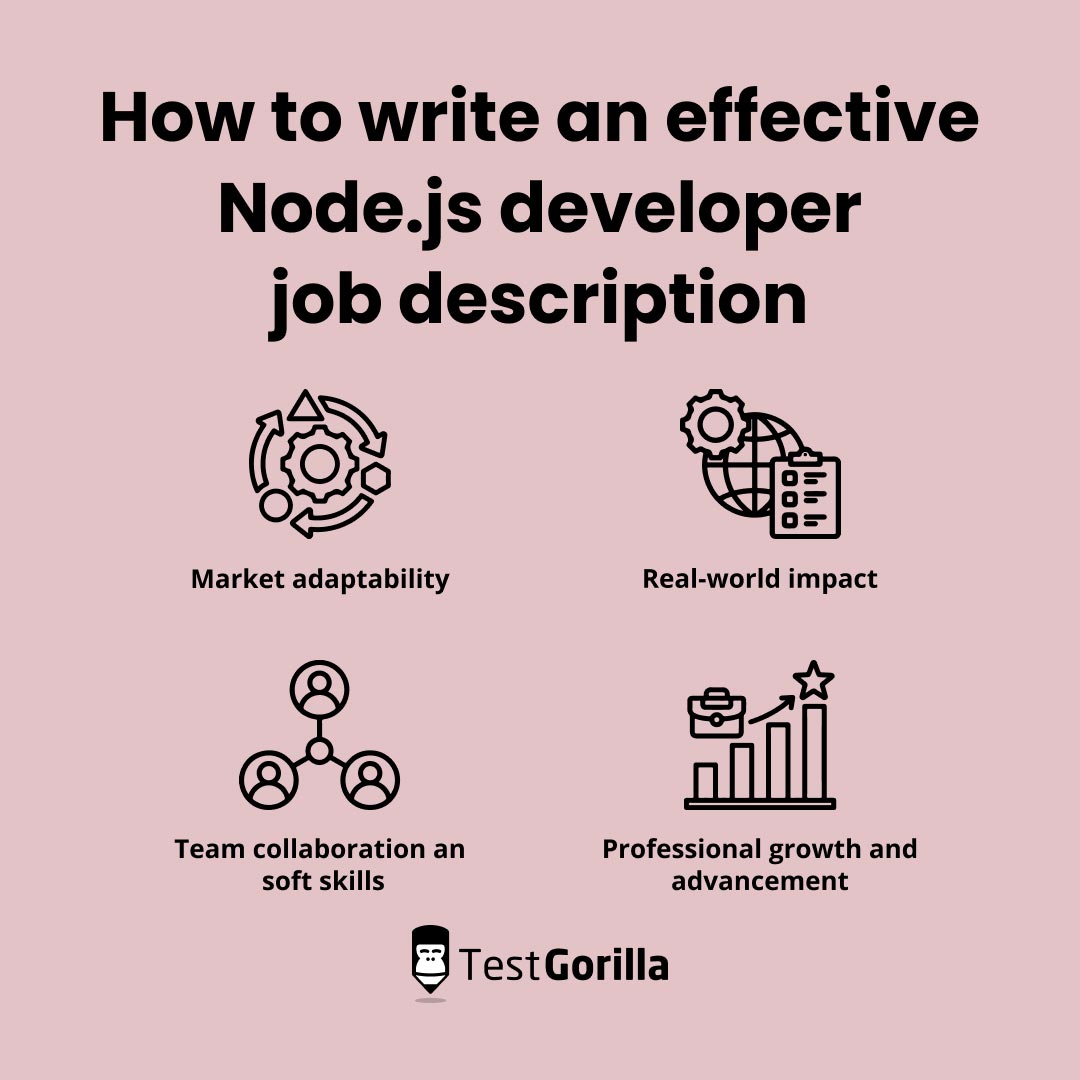The demand for specialized tech talent is at an all-time high, with Node.js developers sought after for their unique skills. The right developer can spark innovation and increase productivity, while a mis-hire can cost you more than the employee's annual salary.
Your journey to hiring a skilled individual begins with crafting an enticing job description. However, highlighting the crucial skills for the role, considering the evolving tech landscape, and marketing the role to suitable applicants can be challenging.
Fear not – we’ve got your back. In this guide, we outline which skills a qualified Node.js developer has and how to write a job description that will attract strong candidates. We’ve also included a handy template to kickstart your hiring process.
Table of contents
- What is a Node.js developer?
- Key skills to look for in Node.js developers
- How to write an effective Node.js developer job description
- Node.js developer job description template
- 4 things to avoid when writing a job description for Node.js developers
- Next steps: Attracting and assessing Node.js developer candidates
- FAQS
- Use our Node.js developer job description template for new hires
What is a Node.js developer?
A Node.js developer is a developer who uses the Node.js framework to build scalable and efficient network applications. The Node.js framework allows developers to create both front-end and back-end applications using JavaScript. It’s super flexible, and developers use it to build various applications.
For example, a Node.js developer working for a social media company might construct real-time chat applications to foster user engagement, while one working for a marketing company could build data analytics tools to monitor user behavior.
Key skills to look for in Node.js developers
Candidates with these hard and soft skills make strong Node.js developers:
Asynchronous programming: Mastery in handling concurrent tasks without blocking execution (e.g., using promises or async/await)
Proficiency in Node.js frameworks: Knowledge of Express for web apps, Koa.js for lightweight apps, and Hapi for scalable apps (e.g., setting up an API with Express)
Database management: Expertise in handling data within apps (e.g., setting up MongoDB and using Mongoose for object modeling)
Strong collaboration skills: Engagement with team members for smooth development and successful project outcomes (e.g., participates in code reviews)
Attention to detail: Thoroughness in writing clean, optimized code, ensuring that functions and modules align with Node.js best practices and project specifications (e.g., fine-tuning performance with precise memory management)
Sound critical thinking: The ability to solve complex problems in application logic or performance optimization, particularly in the asynchronous execution context (e.g., devising effective solutions to handle concurrency issues)
The best insights on HR and recruitment, delivered to your inbox.
Biweekly updates. No spam. Unsubscribe any time.
How to write an effective Node.js developer job description
A strong Node.js job description is persuasive and clear. Here’s what you should include.
Market adaptability
Node.js development is continually evolving. Describe what your company does to stay updated with new frameworks and libraries. Stress the importance of staying current with market trends to attract adaptable candidates.
Real-world impact
Show how the Node.js developer role contributes to the larger goals of your company and the impact it has on your projects or clients. Showcasing the real-world impact of the role can entice candidates looking to make a significant contribution.
Team collaboration and soft skills
Explain the collaborative nature of your development team by describing how Node.js developers will interact with front-end developers, UX/UI designers, and other stakeholders at your company. Name the soft skills your developer will need to work with and on your team – like communication and motivation – to attract candidates with those skills.
Professional growth and advancement
Highlight any continuous learning opportunities that can help candidates stay updated and grow in their roles. In addition, include information on how Node.js developers could advance within your organization, mentioning specific leadership or specialized technical roles. This attracts skilled professionals who want to grow with your company.
Node.js developer job description template
Tailor the template below to your company’s needs.
Company introduction:
In this section, indicate the year your company was founded and its primary goal. Name any novel Node.js technologies or frameworks your company uses. Mention any industry awards or significant project milestones that spotlight your company's competence and innovation. Lastly, explain how Node.js developers are instrumental in driving your company's tech advancements.
Advantages of working at [your company]:
Here, highlight learning opportunities, such as company-sponsored certifications or access to online platforms like Udemy. Explain potential career advancement to attract growth-minded developers. Include any other perks that sell your role.
Node.js developer job brief:
[Business Name]
Role: [Options include Node.js Developer, Node.js Backend Engineer, Senior Node.js Developer, or Node.js Full Stack Engineer]
Supervisory Structure: [Such as Head of Development, Chief Technical Officer, or Engineering Supervisor]
Employment Status: [For example, permanent, contract, office-based, telecommute, or flexible]
[Salary and benefits information]
Node.js developer responsibilities:
Construct and engineer efficient Node.js applications utilizing asynchronous programming techniques.
Merge Node.js solutions with various platforms, and devise APIs for integrating data or services.
Employ Node.js frameworks, such as Express, Koa.js, or Hapi, to enhance the performance of applications.
Remain informed on the newest libraries and frameworks in the Node.js ecosystem.
Develop and oversee unit/functional testing, working alongside QA to ensure thorough testing.
Collaborate with [team members] to deliver high-quality Node.js applications, contributing to peer code reviews for continuous team improvement.
Requirements/qualifications:
Bachelor’s degree in computer science or a related field, an OpenJS Node.js Services Developer (JSNSD) certification, or an OpenJS Node.js Application Developer (JSNAD) certification (or equivalent experience)
Experience with frameworks like Express, Koa.js, or Hapi
Practical knowledge of database technologies like PostgreSQL and MongoDB
Familiar with cloud services like AWS or Azure, and container technologies like Docker
Experience with CI/CD workflows and tools, such as Jenkins and Travis CI
Expertise in designing RESTful APIs
Comprehension of non-blocking I/O operations
Familiarity with debugging tools in Node.js environment (e.g., Node Inspector or ndb)
Basic knowledge of front-end technologies (HTML, CSS, JavaScript)
4 things to avoid when writing a job description for Node.js developers
Don’t make these four mistakes when crafting your node.js developer job description:
1. Neglecting real-time skills
Node.js is prized for crafting real-time applications like chat systems and online gaming. Omitting real-time programming skills from the job description may lead you to hire candidates lacking this expertise – which could increase training time or hinder project success.
2. Ignoring the importance of framework knowledge
Frameworks like Express.js, Koa.js, and Hapi.js streamline Node.js development. Failing to specify familiarity with these frameworks could deter seasoned candidates from applying.
3. Overloading with tool requirements
While you should mention essential tools, an extensive list of tools can overwhelm candidates and divert focus from core skills. This may deter qualified candidates, narrowing the talent pool.
4. Failing to mention asynchronous programming
Node.js thrives on its non-blocking, asynchronous nature. This means it can handle many tasks – like reading files or making network requests – at once. Not mentioning asynchronous programming skills means more candidates unprepared for concurrent processing demands will apply.
Next steps: Attracting and assessing Node.js developer candidates
Share your job description on your company’s careers page and job boards pertinent to the role.
After people have applied for your role, you must verify your applicants’ skills. TestGorilla is a pre-employment testing platform that offers a Node.js online test you can use to assess candidates' understanding of this programming language. This test examines must-have skills: setting up Node.js, recognizing design patterns, choosing the best architectural approach, and building Node.js APIs.
But don't stop at assessing Node.js developers’ coding skills. Dive deeper with tests that assess soft skills, including teamwork, communication, and cultural add.
You can add custom questions, including our Node.js interview questions (or you can save those for your interviews).
Merge a maximum of five tests into one assessment. Once candidates have taken your assessment, you receive their results instantly. This lets you zero in on top-tier Node.js developer candidates swiftly and effectively.
FAQS
How should I structure the technical requirements in my Node.js developer job description?
Begin with the most important skills and experiences for your organization. You might categorize them under “Required skills” and “Desired skills” to help candidates understand what's mandatory and what's optional.
How often should I update the Node.js developer job description?
Update your Node.js developer job description whenever there are significant changes in the role’s requirements. These might be due to industry developments or changes at your company.
Use our Node.js developer job description template for new hires
Finding a capable Node.js developer can boost your tech projects and help your company grow. A strong job description is detailed and will make the role appeal to the best-suited candidates.
After you've got some interested applicants, use TestGorilla's tests for Node.js developers to check their skills. Mix tests to identify a Node.js developer who's not only technically strong but also meshes with your team.
Take our quick product tour or sign up for our free plan to start testing your Node.js developer candidates today.
You've scrolled this far
Why not try TestGorilla for free, and see what happens when you put skills first.
















